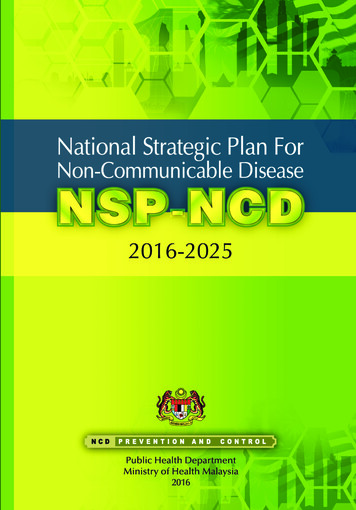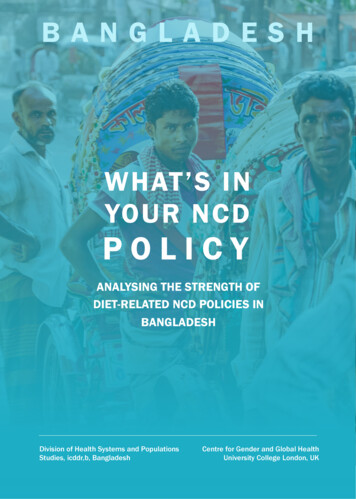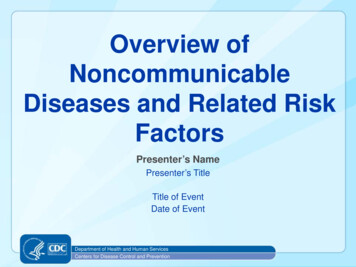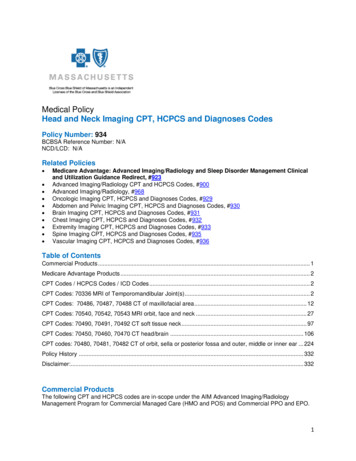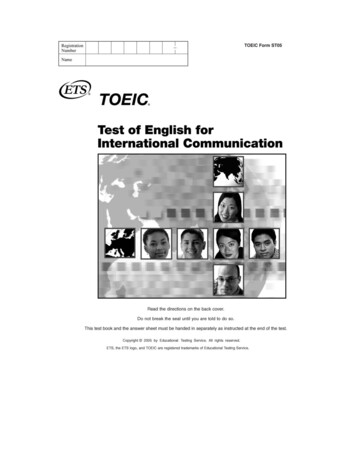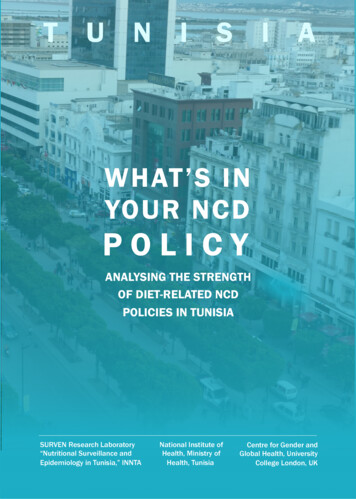
Transcription
T U N I S I AWHAT’S INYOUR NCDPOLICYANALYSING THE STRENGTHOF DIET-RELATED NCDPOLICIES IN TUNISIASURVEN Research Laboratory“Nutritional Surveillance andEpidemiology in Tunisia,” INNTANational Institute ofHealth, Ministry ofHealth, TunisiaCentre for Gender andGlobal Health, UniversityCollege London, UK
The strength of national diet-related policies should match the severity of the burden of noncommunicable diseases (NCDs) in Tunisia, and guide government action focused on the mostcritical dietary drivers and population groups at risk.Yet, while Tunisia has recognised the importance of addressing NCDs, there has been littlerigorous analysis of country-level policies to tackle NCDs associated with unhealthy diets.This brief presents an assessment of national policies and strategies related to promotinghealthy diets and offers evidence-informed recommendations for shaping comprehensive,effective and equitable diet-related NCD policies.The research presented has been conducted as part of a six-country study comparing national NCDpolicies to global recommendations, and evaluating the extent to which policies include effective andequitable attributes to improve population health. Study countries included Afghanistan, Bangladesh,Nepal, Pakistan, Tunisia and Vietnam.Research in Tunisia was led by a team based at the SURVEN Research Laboratory “Nutritionalsurveillance and Epidemiology in Tunisia” in the National Institute of Nutrition and Food Technology,Tunisia, and the National Institute of Health, in partnership with the Centre for Gender and GlobalHealth, University College London.The study was funded by the UK’s Medical Research Council under grant number MR/P025188/1.Date of publication: 2019
PAGE 1N C D S IN TUNISIANon-communicable diseases (NCDs) represent a serious public health problem in Tunisia,prematurely claiming the lives of 62 000 people each year. NCDs account for 86% of all deaths and asignificant share of health expenditure, with 65% of the Ministry of Health budget allocated totherapeutic NCD care.Unhealthy diets, malnutrition and NCDs are closely linked. In Tunisia, particularly high consumptionof sugar and sugar products, vegetable oils and salt, which are significant risk factors for obesity,diabetes and hypertension, plays a key role in rising rates of NCDs.FIG.1NCDS ACCOUNT FOR SEVEN OF THE TOP TEN CAUSES OFPREMATURE DEATH IN TUNISIA – AND ARE ON THE RISETop 10 causes of years of life lost (YLLs) in 2017 and percent change, 2007-2017, all ages, numberTop 10 causes of years of life lost (YLLs) in 2017 and percent change, 2007-2017, all ages, numberFIG.2UNHEALTHY DIET IS AMONG THE MOST SIGNIFICANT – ANDFASTEST GROWING – DETERMINANTS OF NCDSTop 10 risks contributing to DALYs in 2017 and percent change, 2007-2017, all ages, number2017 ranking1234567Metabolic risks8Environmental/occupational risks9Behavioral risks1011 Determinant related to unhealthy dietData for Figures 1 and 2 from Institute of Health Metrics and Evaluation, 2019: http://www.healthdata.org/tunisia
PAGE 2THE GLOBALRESPONSE TO NCDSMany interventions for the prevention and controlof NCDs exist. Given the resource constraintsfacing all countries and their need to prioritise themost effective interventions, the World HealthOrganization (WHO) has identified a set ofevidence-based “Best Buy” interventions that arenot only highly cost-effective but also feasible andrecommended for implementation in all countries.Several of the Best Buys are explicitly aimed ataddressing unhealthy diets.1 These interventionsare designed to mainly address the structuraldrivers and commercial determinants of diet, anapproach likely to yield greater benefits at thepopulation level compared to individuallyfocused interventions.2,3NCDs: On the global agenda at lastWhile the burden of NCDs has beenhistorically neglected by the global healthcommunity, prioritisation and action toprevent and address NCDs is expanding.The first UN General Assembly High-LevelMeeting on NCDs in 2011 marked a criticalturning point in mobilising politicalattention and policy action at national andglobal levels, as did the inclusion of anNCDs-related target in the SustainableDevelopment Goals (3.4, to reducepremature mortality from NCDs by onethird by 2030).2%OF ALL GLOBALHEALTH FINANCING ISALLOCATED TO NCDSACTION IN TUNISIAThe national response to NCDs is largely guidedby the National Multisectoral Strategy to Preventand Control Noncommunicable Diseases (NCDs)Tunisia Policy Analysis: Our research2018-2025 and the National Strategy to Preventand Control Obesity (2013-2017).4 TheseDuring 2017-2019, we undertook an in-depthstrategies have adopted some of the Best Buys,including a target for salt reduction, labelling ofhealthy food products, and media campaigns tostrengthen the population’s awareness onreducing salt consumption. Policy efforts toreduce sugar consumption have also resulted ina 2017 law taxing sugar-sweetened beverages.analysis of the Government’s policies forcontrolling diet-related NCDs, and comparednational responses to global recommendationsfor all countries. The purpose of the study was toidentify where and how policy could bestrengthened to more effectively address thegrowing burden of NCDs in the country.
PAGE 3P O L I C Y D O C U M E N T A N A LY S I S : O U R Q U E S T I O N STHREE DIMENSIONS OF A ROBUST POLICY FRAMEWORK TOADDRESS AND PREVENT NCDS1233C O M P R E H E N S I V E : ARE TUNISIA’S NCD POLICIESCONSISTENT WITH GLOBAL RECOMMENDATIONS? [TABLE 1]E F F E C T I V E : DO TUNISIA’S NCD POLICIES HAVE ADEQUATEAUTHORITY, ACCOUNTABILITY MECHANISMS AND BUDGET?[TABLE 1 & FIGURE 3]E Q U I TA B L E : DO TUNISIA’S NCD POLICIES PROMOTE EQUITYAND HUMAN-RIGHTS BASED APPROACHES? [FIGURE 4]OUR METHODSWe conducted an in-depth policy contentanalysis followed by stakeholder interviews. Thepower, ideas (how the issue is perceived andportrayed), context, and policy characteristicscontent of policies inside and outside the healthsector were reviewed to determine: (1) whetherthey were consistent with WHO Best Buys; (2)how much authority the policy has (e.g. whether(including the severity of the problem and theavailability of effective interventions), tounderstand: (1) why some of the Best Buys havesucceeded in gaining political and policy attention;it is national law or a sector strategic plan); (3)systems of accountability; (4) any associated(2) why other Best Buys are absent from thecurrent policy response; (3) what explains policybudgetary line items; (5) the extent of attentionpaid to issues of equity (including gender) andhuman rights. We synthesised these findingscontent and its characteristics (particularly inrelation to questions of authority, accountability,rights-based approaches, etc); and (4) what itinto a “policy cube” to graphically present keyfeatures of the policy responses to combat diet-would take for neglected/absent Best Buys to behigher up the current policy agenda.related NCDs (see page 6).The study received approval from the ethicsIn-depth interviews were conducted withstakeholders purposely selected from a variety ofboards of the National Institute of Nutrition andFood Technology and the National Institute oforganisations and sectors. We used a policyanalysis framework to explore issues of actorPersonal Data Protection, Tunisia, and UniversityCollege London, UK.
OUR FINDINGSTABLE 1. TUNISIA’S NCD-RELATED HEALTH POLICIES: COMPREHENSIVENESSOF BEST BUYS AND POLICY EFFECTIVENESSBest Buys: Cost-effective interventionsPresent?AuthorityAccountabilityBudget Reduce salt intake through reformulation of food products and settarget levels for salt in foods and meals Goal to decrease salt consumption Reformulation of food products to decrease salt Set target salt level in foods 30% reduction in salt consumption Reduce salt intake through the establishment of a supportiveenvironment in public institutionsReduce salt intake through a behaviour change communication andmass media campaign Mass media campaign to reduce salt intake Behaviour change communication on salt Reduce salt intake through front-of-pack labellingEffective interventions Cost effectiveness of / 100 per disabilityadjusted life year averted in low & middle-income countriesEliminate industrial trans-fats through the development of legislationto ban their use in the food chain Goal to eliminate industrial trans-fats Legislation to ban use of trans-fats in food chainxxxx Reduce sugar consumption through effective taxation on sugarsweetened beverages Goal to reduce sugar intake Taxation on sugar-sweetened beverages Subsidies to increase uptake of fruits and vegetablesxxxxReplace trans-fats and saturated fats with unsaturated fats throughreformulation, labelling, fiscal or agricultural policies Limit portion and package size to reduce energy intake and the riskof overweight/obesityxxxxImplement nutrition education and counselling to increase intake offruits and vegetables Implement nutrition labelling to reduce total energy intake (kcal),sugars, sodium and fats Implement mass media campaign on healthy diets Promote exclusive breastfeeding for first 6 months of life Other recommended interventions
PAGE 5TABLE 1. KEYAuthorityAccountabilityBudget High authority – legislation in Abides by key principles of Budget line item assigned A national lead/implementingagency is named and assignedresponsibility for reporting in thepublic domain Budget line item plannedbut no evidence for lineitem identified No mechanism for accountabilityfound No budget line itemidentifiedplace (e.g. law, decree, decision,ministerial circular) Medium authority – legislationproposed to address the issue Low authority – no existing,planned or proposed legislationto policy sub-componentaccountability5POLICIES WITH BEST BUY INTERVENTIONSNational Strategy to Prevent and Control Obesity (2013-2017)National Multisectoral Strategy to Prevent and Control of Noncommunicable Diseases (NCDs) 2018-2025FIG. 3HIERARCHY OF POLICY AUTHORITY IN TUNISIAThe relative level of authority of different policy documents hasbeen categorised, which can indicate the likelihood thatbureaucrats, industry and society will act on them.CONSTITUTIONLAWS/ACTSPOLICYRULESREGULATIONS CIRCULARSDIRECTIVESACTION PLANSSTRATEGIES GUIDELINESFIG. 4HEALTH AND RIGHTS IN TUNISIA POLICYRights-based policies can strengthen countries’ efforts to address the determinants of NCDs. A rights-basedapproach has been central to progress in the AIDS response, both in ensuring that individuals are protectedagainst discrimination and committing the State to take positive actions. We find however, that human rightslanguage and concepts are largely absent from NCD policies.6NCD POLICYNo human rights languagecontained in national NCD policydocumentsHIV POLICYThe National Strategic Plan for HIV and STIs 2015-2018makes approximately 50 references to rights andcommits to legal reforms to reduce stigma anddiscrimination, to guarantee the dignity of people livingwith and affected by HIV as well as their access toservices, and to strengthen capacity to understand andaddress human rights.Strategic Axis 3 of the National HIV/AIDS Strategic Plan2012-2016 is to “Reform of the juridical frame andpromotion of human rights for the guarantee of humandignity and the reduction of stigma and discriminationin all contexts of the response to HIV/AIDS.”
PAGE 6BRINGING IT ALL TOGETHER:THE POLICY CUBEThe “Policy Cube,” brings together the three axesof our policy content review: 1) dietary policyEffectiveness. Policies would benefit fromenhanced effectiveness: only a third of the Bestcomprehensiveness, or the extent to which WHOBest Buys are reflected in national policydocuments; 2) the effectiveness of a policy’sBuys score positively for authority, accountabilityand budget. Specific budgets were identified forjust over half of the actions associated with BestBuys in Tunisia’s policies. With only one-third ofimplementation and enforcement mechanisms,such as the level of authority of the policy,whether it has an associated budget, and whethersystems of accountability are specified, and; 3) theextent to which policy documents are orientedtowards principles of equity, gender and human2rights. A full cube would represent a robust policyframework for the prevention and control ofNCDs.the Best Buys abiding by key principles ofaccountability, action is especially needed inspecifying the role and liability of each partyinvolved.Equity. A positive trend towards human rights,gender and equity language was identified inTunisia’s HIV policies, but entirely lacking in itsNCDs policies. Despite the strong rights-Comprehensiveness. With 16 out of the 19 BestBuys and at least one green light in all 16 (seeorientation of the 2014 Constitution, including itsrecognition of the right to health for all people,Table 1), Tunisia’s NCD policies arecomprehensive and perform generally well interms of the effectiveness of their implementationand enforcement mechanisms.NCD policies contain no specific commitments tohealth equity or the right to health. Tunisia’s NCDpolicies require significant action to strengthentheir equity- and rights-orientation, following theprecedent set by the country’s HIV policies.FIG. 5POLICY CUBE TUNISIA: THREE DIMENSIONS OF ASSESSING NCDPOLICY FRAMEWORKSEffectiveness (authority,accountability, budget):MODERATEPERFORMANCE OFPOLICYFRAMEWORKEquity, gender and rightsorientation:NEEDS STRONG ATTENTIONComprehensiveness of bestbuy measures:HIGH
PAGE 7S TA K E H O L D E R S W E I G H I NINTERVIEWS WITH STAKEHOLDERS ON THEMAJOR IMPEDIMENTS TO PROGRESS INADVANCING THE NCD AGENDA: KEY FINDINGSPOWERNeed for higher levelpolitical leadershipand authority“There is the national committee for prevention and control ofnoncommunicable diseases, which should be led by the head ofgovernment. We tried to have it supervised by the Ministry of Health but itwas not effective enough We would be more effective if we had moreauthority – when the decision comes from the head of the government,everyone abides by it.ID11, Government representativeISSUECHARACTERISTICSNeed for strategicinformation thatshows gains of BestBuys and costs ofinaction“OPPOSITIONPolicy inactionstemming from alack of (political)resolve to adoptunpopular decisions“What will push political deciders to act on the Best Buys is thenumbers. We have the NCD prevalence data, but decision makersneed to see the effectiveness of the best buys. What have othercountries that adopted these Best Buys achieved – and how does thatcompare to the alarming trends in Tunisia?ID3, Public Health representativePoliticians' fear the public’s reaction to a suppression of the sugarsubsidy, which is likely to deter them from implementing the action.There is a problem of trust between the people and the government.People don’t trust that the government is removing sugar subsidies toimprove health. That is why the cooperation of civil society and the UGTT(Tunisian General Labour Union) is very important, because they arecloser to the people.ID7 IndustrialCULTURENeed to targetwomen and childrenin order to shiftconsumer habitsand preferencesearly“In Tunisia we are used to a very sweet taste, and industry adapts todemand. These habits can be changed, especially with regard to children.This can be done in collaboration with the Ministry of Education and theMinistry of Women and Children.ID 15, Government official in the industrial sector“It would be good if the Ministry of Women and Children targetedhousewives. Sensitising women will directly influence eating habits athome without impacting cost. Sessions could be organised in primaryhealth centers, in the places where mothers gather, and in the televisedprograms that are intended for them, in order to transmit the messagethat poor nutrition negatively affects the health of their children. Inschools, we should train teachers to convey simple but effectivemessages on health and nutrition to children.ID4, Academic
PAGE 8R E C O M M E N DAT I O N SThe following recommendations arise from our policy analysis and stakeholder interviews.They should be considered as a strategic package of elements that are mutually reinforcingand interdependent, and require the engagement of a range of identified stakeholders.1. Reform the National Technical Committee for Prevention and Control of NCDs into ahigh-level multi-sectoral coordination mechanism, focused on a national healthyeating strategy. To enhance the likelihood of the implementation of WHO Best Buysacross sectors, strengthen a coordination mechanism led by the office of the PrimeMinister that would report to Parliament while ensuring that all sector interests aretaken into consideration through the representation of the Ministries of Health, Trade,Industry and Agriculture as well as prominent unions and consumer groups.2. Adopt human rights-based approaches. The human rights language in the 2014Constitution should be reflected in NCD policies to ensure greater accountability forimplementation of evidence-informed, gender-responsive and equitable efforts toprotect, respect and fulfil Tunisians’ rights to healthy diets – in line with the approach ofTunisia’s HIV response.3. Introduce a phased and politically-sensitive approach to WHO Best Buys. Publichealth advocates and their allies should work with politicians and policy-makers toensure that evidence-informed reforms are acceptable to the public. Reforms may needto be introduced incrementally to reduce public or industry opposition.4. Disseminate evidence of what works and costs of inaction. Encourage the Ministry ofHealth and its partners (e.g. WHO, academic institutions) to develop a policy brief toinform politicians and policy-makers on the return on investment of the Best Buys, toinclude: 1) impact of Best Buy interventions achieved in other countries, and 2) modelledhealth and other costs of inaction.5. Draw lessons from previous successful multi-sector mass media awareness raisingcampaigns. Encourage the National Technical Committee for Prevention and Control ofNCDs to undertake a formative assessment of past campaigns to inform thedevelopment of healthy eating sensitisation campaigns, in collaboration with aprofessional advertising agency, which would motivate the general public to changeconsumption behavior and strengthen their support for state interventions.6. Engage a range of civil society organisations as partners. Civil society organisations,including local and community-based, can be mobilised to disseminate messages andactions for NCD prevention and control among all sections of the population.7. Strengthen capacity of academia to support the NCDs response. Involve researchersand assist them in conveying and popularising key evidence and messages, which canhelp the policy community reach an agreement on the definition and solutions to dietaryproblems.8. Provide technical support to industrialists to produce healthier products. The Ministryof Industry should recruit nutritionists to work on reformulating industrial products inTunisia, and collaborate with industry to create and test healthier versions of products.9. Engage the private health care sector, working alongside them and incentivising themto pay more attention to the nutritional aspect and quality of diet in patient care.
REFERENCES1World Health Organization. ‘Best Buys’ and Other Recommended Interventions for the Prevention and Control ofNoncommunicable Diseases. https://www.who.int/ncds/management/WHO Appendix BestBuys.pdf2Roberts, S, Pilard, L, Chen, J, Hirst, J, Rutter, H, Greenhalgh, T. (2019). Efficacy of population-wide diabetes andobesity prevention programs: An overview of systematic reviews on proximal, intermediate, and distal outcomesand a meta-analysis of impact on BMI. Obesity Reviews; 1– 17.3Stuckler, D., & Nestle, M. (2012). Big Food, Food Systems, and Global Health. PLoS Medicine; 9(6), ages/snplo-plan-de-mise-en-oeuvre.pdf5Key principles of accountability, namely: i) a national lead/implementing agency is named and is assignedresponsibility for reporting in the public domain; ii) a mechanism for independent monitoring of progress onimplementation is described; and iii) remedial actions/sanctions/fines are outlined if implementation progressdoes not occur. From: Williams C, Hunt P. (2017). Neglecting human rights: accountability, data and SustainableDevelopment Goal 3, The International Journal of Human Rights; DOI:10.1080/13642987.2017.1348706.6Buse K, Aftab W, Akhter S, et al. Time to clarify State obligations and accountability on NCDs with human rightsinstruments. BMJ Global Health 2019;0:e002155. doi:10.1136/bmjgh-2019-002155
For further information, please contact:Prof. Jalila El Atijalila.elati@rns.tnProf. Hajer Aounallah-Skhirihajer.skhiri@rns.tnFind a digital copy of this brief at:Centre for Gender and Health, UCLwww.ighgc.org/projects/pa4ncdsHealthy Societies 2030www.healthysocieties2030.org/ncds/policy
it is national law or a sector strategic plan); (3) systems of accountability; (4) any associated budgetary line items; (5) the extent of attention paid to issues of equity (including gender) and human rights. We synthesisedthese findings into a "policy cube" to graphically present key features of the policy responses to combat diet-

